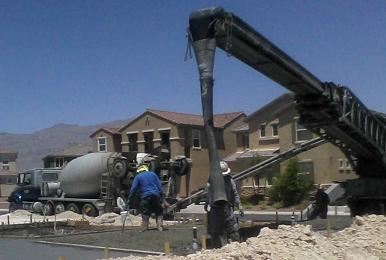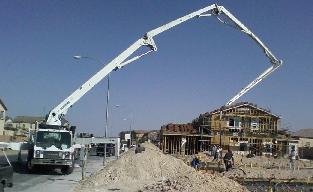|
[?]Subscribe To This Site
|
Concrete Pump a Necessary CostSuch concrete pump as those shown in the photos is the most effective wau to deliver concrete to its final destination. The two different concrete pumping trucks shown in the photos are in the process of pumping concrete. Sometimes when there is a huge area to cover but not enough clearance, series of hoses are added and is then called concrete line pumps or grout pump in the case of cmu block walls.
Whether pouring concrete footings, concrete foundations, cement floors, concrete patio, etc using concrete pumping services, though an added cost but very necessary to ensure quality of your concrete. The most critical of all concrete pours is timing. Concrete will set and start curing in matters of minutes so timely delivery is extremely important.Due to the immense size and weights of cement trucks, bringing them close to the pour is extremely risky. Their heights are capable of damaging personal properties, power or cable lines. Its weight can crush driveways, sidewalks, patios, sewage lines, water lines, utilities, etc. Considering all the potential damages a cement truck can cause, spending $200-$300 on a cement pump truck is a great investment. Wheelbarrow can be an option but it has it’s limit. The most that I had poured with wheelbarrow was a 9 yard for a backyard patio. This is not something I recommend for those that are new to doing concrete work. It takes a lot of energy. Wet concrete is one of the most difficult to move with wheelbarrow, especially if you are new. There are 3 different types of pumps that are commonly used: concrete pump boom truck, concrete line pump, and grout pump. Concrete Boom Truck:
Generally, the smallest truck charge about $200+/-minimum plus additional $3+ per cubic yard pumped. If the truck has to travel farther beyond certain zone, extra travel charges will be added. Any job that takes more than 2 hours will add $100+/- per hour. Most pumping companies require an area to washout after the job, if no such area provided additional $50+/- will be added. When ordering concrete pumps services for your cement floors, footings or foundations make sure to discuss all the “hidden” charges. The information that will be required from you include address of the pour, type of pour (i.e. footings, foundations, slabs), number of yards, name of concrete ready-mix supplier, date & time of pour. Concrete Line Pump:
Another advantage of Line pumps they pump normal concrete with aggregates ¾ inches diameter. This is a big bonus because the mix design is not altered and thus cost of concrete will not change. The biggest advantage of line pumps, they are very inexpensive, approximately 1/3 the cost of boom trucks. Line pump is comprised of sections of hoses connected together, thus the name. For a 10 yard pour, the hose is fairly easy to move, one strong person can maneuver the hose around. At 20 to 30 yards pour, 2 to 3 people will be needed to move the hose. On bigger pours 200 to 300 yards range will need 5 to 10 people to maneuver the hose. As you can see the savings on boom truck pumps go to man power labor for moving the hose. Grout Pump: Grout pump is a smaller version of line pump and they are used for grouting CMU (concrete masonry unit) walls. Grout pump can be used for concrete but the mix design had to be altered to fit the smaller pump. Pea gravel mix is the mix needed in order to use a grout pump.When you shop for a concrete pump, be sure to ask if it is a grout pump. If it is you need to change your concrete mix to pea gravel which is an extra $5 to $10 per yard. The extra cost is due to the extra cement added Back to Concrete Pump |
|







